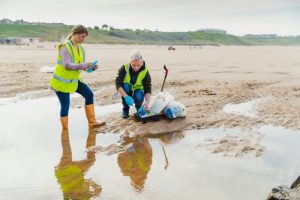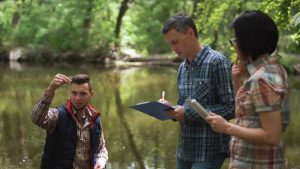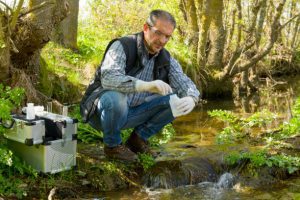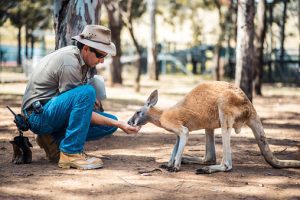Do you love plants and animals?
Marine careers work with plants, animals, bugs, fish, and reptiles of all sizes and shapes.
They study all the parts of living beings on earth: anatomy, behavior, evolution, habitats, health, and physiology.
The subject is so broad that there are hundreds of specialties.
1. Botanist

Why Become a Botanist?
Botanists study plants, fungi, and algae.
They may examine how plants grow under different conditions to help a country avoid crop failures and famine.
Jobs in botany include landscaping, agriculture, and teaching.
A research botanist requires going to college and graduate school, but there are jobs that will train you on the job.
Working part-time at a nursery is a good way to see if botany is a good fit for your future.
| Botanist Key Stats | |
|---|---|
| Avg. Salary / year | $83,040 |
| Avg. Pay / hour | $39.92 |
| Education | 4+ Years |
| Job Outlook | 7% |
| Total Employed | 16,600 |
Read the full career guide: How to Become a Botanist
2. Marine Biologist

Why Become a Marine Biologist?
A marine biologist studies life in the sea.
A marine research biologist has many choices.
There are millions of creatures and organisms living in the sea.
You might find ways to help fish survive as the ocean temperature increases.
Or you could lead a rescue operation to save wildlife after an oil spill.
With a bachelor’s degree in marine science, you could train dolphins at an amusement park.
Or nurse stranded whales.
As a high school student, you could volunteer to track turtle nests or help a marine biologist collect research information.
| Marine Biologist Key Stats | |
|---|---|
| Avg. Salary / year | $100,440 |
| Avg. Pay / hour | $48.29 |
| Education | 4+ Years |
| Job Outlook | 5% |
| Total Employed | 59,710 |
Read the full career guide: How to Become a Marine Biologist
3. Ecologist

Why Become an Ecologist?
An ecologist looks at the circle of life and how the parts affect one another.
Environmental worries about global warming make this an important field.
There are opportunities for ecologists at all levels of education.
As an ecologist, you might work for a government agency to develop regulations that protect the environment.
Or you might become a writer or advocate for environmental concerns.
If you want to become an ecologist, take all the math and science you can in high school.
Then look for colleges with majors in ecology, environmental science, or climatology.
| Ecologist Key Stats | |
|---|---|
| Avg. Salary / year | $88,640 |
| Avg. Pay / hour | $42.62 |
| Education | 4+ Years |
| Job Outlook | 11% |
| Total Employed | 84,930 |
Read the full career guide: How to Become an Ecologist
4. Oceanographer

Why Become an Oceanographer?
Oceanographers study ocean waters and coastlines.
Or you might work in meteorology to predict hurricanes and tsunamis.
These fields are rewarding but require a lot of preparation. Oceanographers major in geology, biology, oceanography, or meteorology.
One interesting field that combines oceanography with computer science is weather modeling.
With the right combination of computer coding, math, and engineering skills, you can improve the accuracy of weather predictions about extreme weather events.
| Oceanographer Key Stats | |
|---|---|
| Avg. Salary / year | $116,680 |
| Avg. Pay / hour | $56.10 |
| Education | 4+ Years |
| Job Outlook | 6% |
| Total Employed | 8,440 |
Read the full career guide: How to Become an Oceanographer
5. Crab Fisherman

Why Become a Crab Fisherman?
Do you love fishing?
Crab fishing is a risky career – if you get caught in bad weather you could lose your life.
On the other hand, you’ll be outside and not tied down to a desk.
You don’t need a college degree, but you do need to live near crabs.
In the US, this is mostly in the Northeast.
Physical strength is vital.
Summer construction work will help develop strength, coordination, and job skills.
Unless you know someone with a crab fishing boat, getting the first job is tricky.
The more skills you have to offer, the better your chances.
| Crab Fisherman Key Stats | |
|---|---|
| Avg. Salary / year | $41,730 |
| Avg. Pay / hour | $20.06 |
| Education | 0-6 Months |
| Job Outlook | 2% |
| Total Employed | 442,050 |
Read the full career guide: How to Become a Crab Fisherman
6. Environmental Scientist

Why Become an Environmental Scientist?
Environmental science is a multidisciplinary field that requires knowledge of biology, oceanography, climatology, geophysics, computer science, and even law.
Environmental law is one of the hottest jobs outside technology.
As an environmental scientist, you will study the environment and propose solutions to big problems like global warming, pollution, water shortages.
With the right education, you can be instrumental in helping populations avoid droughts, crop failures, and famine.
| Environmental Scientist Key Stats | |
|---|---|
| Avg. Salary / year | $88,640 |
| Avg. Pay / hour | $42.62 |
| Education | 4+ Years |
| Job Outlook | 15% |
| Total Employed | 84,930 |
Read the full career guide: How to Become an Environmental Scientist
7. Ship Captain

Why Become a Ship Captain?
Ship captains steer and manage boats of all sizes.
You may captain a fishing vessel that caters to fishing tourists.
Or breaking ice to allow cargo ships safe entry into a harbor.
You will need to learn shipping skills, especially navigation.
Joining the US Navy is one way to work your way into the captain’s chair.
In addition to licensing and shipping skills, you will need to build leadership skills through volunteer work.
| Ship Captain Key Stats | |
|---|---|
| Avg. Salary / year | $97,660 |
| Avg. Pay / hour | $46.95 |
| Education | 4+ Years |
| Job Outlook | 2% |
| Total Employed | 35,390 |
Read the full career guide: How to Become a Ship Captain
8. Zoologist

Why Become a Zoologist?
Do you love animals?
Do you love to work outside?
A zoologist studies animals and wildlife to see how they interact with the environment, other animals, and the ecosystem.
A zoologist who works in the field, like Jane Goodall, may be called a wildlife biologist.
An internship is a great way to get experience in high school and college.
| Zoologist Key Stats | |
|---|---|
| Avg. Salary / year | $77,920 |
| Avg. Pay / hour | $37.46 |
| Education | 3-4 Years |
| Job Outlook | 5% |
| Total Employed | 16,920 |
Read the full career guide: How to Become a Zoologist
9. Horticulturalist

Why Become a Horticulturalist?
If plants are your thing, think about horticulture as a career.
Horticulturalists work with plants and trees.
You could nurture exotic orchids or discover a pest-resistant crop to stop a famine.
Landscaping and flower shops are other options.
An associate’s degree in horticulture or agriculture will open up many opportunities.
If you get a doctorate, you can specialize in genetic or animal breeding.
| Horticulturalist Key Stats | |
|---|---|
| Avg. Salary / year | $40,880 |
| Avg. Pay / hour | $19.66 |
| Education | 4+ Years |
| Job Outlook | -0.8% |
| Total Employed | 943,430 |
Read the full career guide: How to Become a Horticulturalist
10. Clinical Laboratory Technician

Why Become a Clinical Laboratory Technician?
Clinical lab technicians assist doctors in testing samples and analyzing the results.
This profession requires exemplary organizational skills and a focus on detail.
Lab techs work behind the scenes to curb epidemics, diagnose medical problems, and maintain public health and safety.
If you love science and want to work in a lab with cutting-edge equipment, look into becoming a clinical lab technician.
| Clinical Laboratory Technician Key Stats | |
|---|---|
| Avg. Salary / year | $65,320 |
| Avg. Pay / hour | $31.41 |
| Education | 1-2 Years |
| Job Outlook | 11% |
| Total Employed | 343,040 |
Read the full career guide: How to Become a Clinical Laboratory Technician










